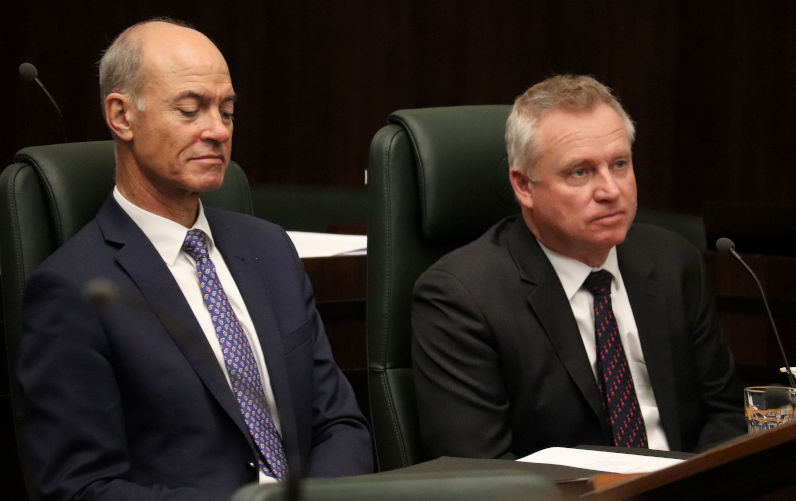Tasmania in the news for all the wrong reasons
June 14, 2025
It’s rare that the biggest news in Australian politics emanates from Tasmania.
But mixture of minority government, a no-confidence motion and an AFL stadium imposed on the Liberal Government led by Premier Jeremy Rockliff did the trick.
The state now faces an election – only 14 months after the last one which saw the Liberals, in office for 11 years now, having to cut deals with independents in order to continue in office.
The election has been precipitated by the surprise move last week of the Labor Party to move a no-confidence motion in Rockliff. The Liberals have 14 seats, Labor 10, the Greens 5 and independents 6 in the 35-seat lower house. Labor leader Dean Winter got the support of the Greens and the majority of the independents for his motion to succeed.
Why now? Ostensibly because of the disastrous budget Treasurer Guy Barnett brought down last month that, as prominent economist Saul Eslake notes, sees general government sector net debt reaching $10.2 billion by 30 June 28, and to rise a further $10.2 billion by 30 June 2029.
From a constitutional perspective, Winter’s no-confidence motion was interesting in that it was not one in respect of the government as is the usual practice, but against the premier. This is why Governor Barbara Baker did not immediately grant Rockliff an election when he visited her over the weekend.
Instead, she explored alternatives such as Winter forming government. But the Labor leader would have had to come to an agreement with the Greens, and the ALP in Tasmania has a pathological hatred of the party, based on its experiences in 1989-1992 and 2010-2013 when the Greens supported the governments of Michael Field, David Bartlett and Lara Giddings.
It was said that, to avoid an election, Rockliff should resign. This would have potentially seen the most right-wing politician in Tasmania, and in the nation, former Howard Government minister Eric Abetz, become premier. Rockliff wouldn’t shift. So the premier finally got what he sought, and Tasmanians are stuck with a 19 July election.
Looming over this election is the controversy over the proposed AFL stadium to be built on prime land at Macquarie Point in Hobart. The AFL, confirming its status as the most arrogant and dictatorial sporting organisation in Australia, has made it a condition of Tasmania having its own team that it build the stadium.
Rockliff, and for that matter the Labor Party are ignoring strong public opinion and the views of most of the independents, upper house MPs, and federal politicians like Andrew Wilkie and Jacqui Lambie, who oppose this hideously expensive piece of infrastructure that will sit idle most of the year.
The cost of the stadium has already risen from $715 million to $945 million. An independent assessment by economist Nicholas Gruen and the planning body assessing the project have both been damning of the decision-making and cost of the stadium. The response of the government has been to accuse both Dr Gruen and the Tasmanian Planning Commission of “apprehended bias”. What the government means, of course, is that the truth hurts.
The AFL’s conduct in all this has been appalling. It cares nothing for the democratic process and public sentiment. It calls the shots and both Rockliff and Winter are happy to be bullied.
Tasmania is in a mess. The AFL stadium seems to have priority over fixing chronic homelessness, the worst educational and health outcomes in non-Indigenous Australia. And the debt crisis is worse than that of the much publicised Victoria.
The government has walked away from a treaty process with the state’s Aboriginal groups, promising instead a truth-telling commission. Human rights protections are minimal and the criminal justice system sees people in remand awaiting trial for two to three years. The government has pursued a law and order agenda that will see an increase of young people in detention. Recently the Office of Custodial Inspector revealed that children are being kept in police watch houses, and girls strip-searched by male officers in some cases. While Rockliff’s predecessor, Peter Gutwein, won plaudits for his decision in 2021 to close the notorious hell hole, the Ashley Youth Detention Centre, it remains open today. The abuse of children and youth continues despite the damning findings of a Commission of Inquiry into institutional abuse in 2023.
The reality of Tasmanian politics today is that cross-bench parliaments are here to stay. The election may even see more independents elected, for example, former ABC journalist and anti-salmon campaigner, Peter George, who ran in the federal election against Albanese Government minister, Julie Collins, and gave her a scare.
Labor is banking on winning seats from what is clearly an incompetent government (it has botched spectacularly the delivery of two new Bass Strait ferries among other disasters). But to achieve majority government, Labor would need to win 18 seats. This is beyond its ability.
Ironically then, if it wants to form government, it will have to cut some sort of deal with the Greens.
The depressing feature of Tasmanian politics is that most of the shallow pool of talent in the parliament is not part of the executive. Greens MPs like Vica Bayley and upper house independents Ruth Forrest and Meg Webb would inject long-term smart policy-making that Tasmania desperately needs.
But this election is unlikely to see any big picture vision or serious reform proposals, such as to the tax system or size of government, from Rockliff or Winter. Still there might be a silver lining if the obscenely expensive stadium is off the table.
The views expressed in this article may or may not reflect those of Pearls and Irritations.


